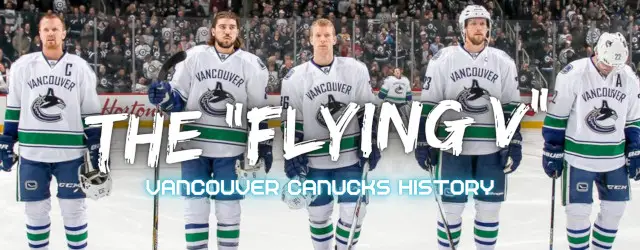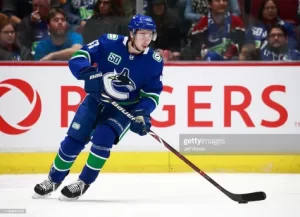The Vancouver Canucks are a professional ice hockey team based in Vancouver, British Columbia, Canada. The team was founded in 1945 as a Pacific Coast Hockey League (PCHL) member, eventually becoming the Western Hockey League (WHL). The Canucks joined the National Hockey League (NHL) in 1970 as an expansion team.
Early Years
The team's early years were marked by instability as they bounced between leagues and ownership groups. In the PCHL/WHL, the team struggled to attract fans and was often near the bottom of the standings. The Canucks won their first PCHL championship in 1958, but it wasn't until the 1960s that the team began to gain traction.
In 1967, the NHL announced it would expand to 12 teams, and Vancouver was one of six cities awarded a franchise. The Canucks' inaugural NHL season in 1970-71 was a tough one, as they finished with a record of 24-46-8 and missed the playoffs. But the team showed promise, with young stars like Bobby Lalonde and Dale Tallon leading the way.
The following year, the Canucks made the playoffs for the first time in their NHL history. They upset the heavily favored Chicago Blackhawks in the first round before losing to the eventual Stanley Cup champion Boston Bruins in the second round. The series against Boston was notable for the physical play and numerous fights, which set the tone for the team's reputation as a rough-and-tumble squad.
Flying V
The Canucks struggled in the following years, missing the playoffs in five of the next six seasons. But 1978-79, the team made a surprising run to the Stanley Cup Final. Led by rookie goaltender Richard Brodeur and the "Flying V" formation, the Canucks defeated the Toronto Maple Leafs and New York Islanders in the playoffs before losing to the Montreal Canadiens in the Final.
The 1980s
The 1980s were a tumultuous decade for the Canucks. The team made the playoffs twice in the first eight years of the decade, and ownership changed hands multiple times. In 1982, the team was purchased by Arthur Griffiths, who helped stabilize the franchise and build a new arena, now known as Rogers Arena.
The Canucks' fortunes turned in the late 1980s, thanks partly to the arrival of future Hall of Famer Trevor Linden. In 1989-90, the team won its first division title and made it to the second round of the playoffs. The following year, the Canucks advanced to the Stanley Cup Final for the second time in their history, losing to the Mark Messier-led Edmonton Oilers.
The early 1990s were a time of upheaval for the Canucks, as they traded away critical players like Linden and Pavel Bure. But the team bounced back in 1993-94 with a roster that included Bure, Kirk McLean, and Geoff Courtnall. The Canucks finished the regular season with the best record in the league and made it to the Stanley Cup Final for the third time in their history.
1994 Final against the New York Rangers was among the most memorable in NHL history. The Canucks won the first game of the series before losing three in a row. They rallied to win the next two games and force a seventh and deciding game, ultimately losing 3-2. The series was marked by controversy, including a non-call on a potential penalty against the Rangers in Game 6 and an injury to Bure in Game 7.
Canucks Struggles
The Canucks struggled in the following years, missing the playoffs in eight of the next ten seasons. But in 2011, the team made a surprising run to the Stanley Cup Final, led by the Sedin twins, Henrik and Daniel. After making it to the Stanley Cup Finals, though, they struggled to maintain that level of success in the following years and, between 2011 and 2023, went through several changes and challenges.
In the 2011-2012 season, the Canucks won their second consecutive Presidents' Trophy for finishing with the most points in the NHL regular season. However, they were eliminated in the first round of the playoffs by the eighth-seeded Los Angeles Kings in just five games.
The following year, the Canucks finished third in the Western Conference but were eliminated in the first round of the playoffs again, this time by the San Jose Sharks in four games.
The 2013-2014 season saw the Canucks miss the playoffs for the first time since 2008. The team underwent a rebuild, trading away some of its key players and acquiring younger talent.
In the 2014-2015 season, the Canucks made the playoffs as a wild-card team but were eliminated in the first round by the Calgary Flames in six games.
The 2015-2016 season saw the Canucks finish out of the playoffs again, but the team continued to rebuild, bringing in new players and focusing on developing their younger talent.
The 2016-2017 season saw the Canucks miss the playoffs for the second consecutive year, but they continued to make progress with their younger players. Rookie forward Brock Boeser was a standout, scoring 29 goals in his first NHL season.
In the 2017-2018 season, the Canucks finished near the bottom of the NHL standings, but Boeser continued to impress, scoring 29 goals and being named a finalist for the Calder Trophy as the NHL's rookie of the year.
A New Hope
The 2018-2019 season saw the Canucks make significant strides, finishing just outside the playoffs. Boeser continued to shine, but the team also got strong performances from rookie forward Elias Pettersson, who scored 28 goals and was named the NHL's Rookie of the Year.
In the 2019-2020 season, the Canucks returned to the playoffs for the first time in five years, qualifying as a wild-card team. They upset the defending Stanley Cup champion St. Louis Blues in the first round before being eliminated by the Vegas Golden Knights in the second round.
The 2020-2021 season saw the Canucks struggle, finishing near the bottom of the NHL standings. However, there were still bright spots, including the emergence of rookie defenseman Quinn Hughes, who had 41 points in 56 games.
In the 2021-2022 season, the Canucks missed the playoffs again, but there were signs of progress. Hughes continued to develop into one of the NHL's top young defensemen, while forward Bo Horvat had a career year, scoring 38 goals.
Wrap Up
Looking ahead, the Canucks have a solid core of young players and are focused on continuing to develop and improve. While there have been ups and downs over the past decade, the team remains a vital part of Vancouver's sports culture, sports betting scene and will continue to strive for success in the future.
Sports Team History looks at the history and logo of each professional sports team to have ever existed from the MLB, MLS, NBA, NCAA, NFL, NHL, Premier League, WNBA, XFL, ABA, AAF, or USFL.
One of our partner sites is Sports Logo History, a community of sports logo enthusiasts who enjoy each team’s logo history. In addition, we have added Sports News History to our sports history websites. 24/7 non-stop sports news that's worth knowing. Finally, the premier sports team marketplace for your favorite team or college, with thousands of items for you to peruse at Sports Market History.


